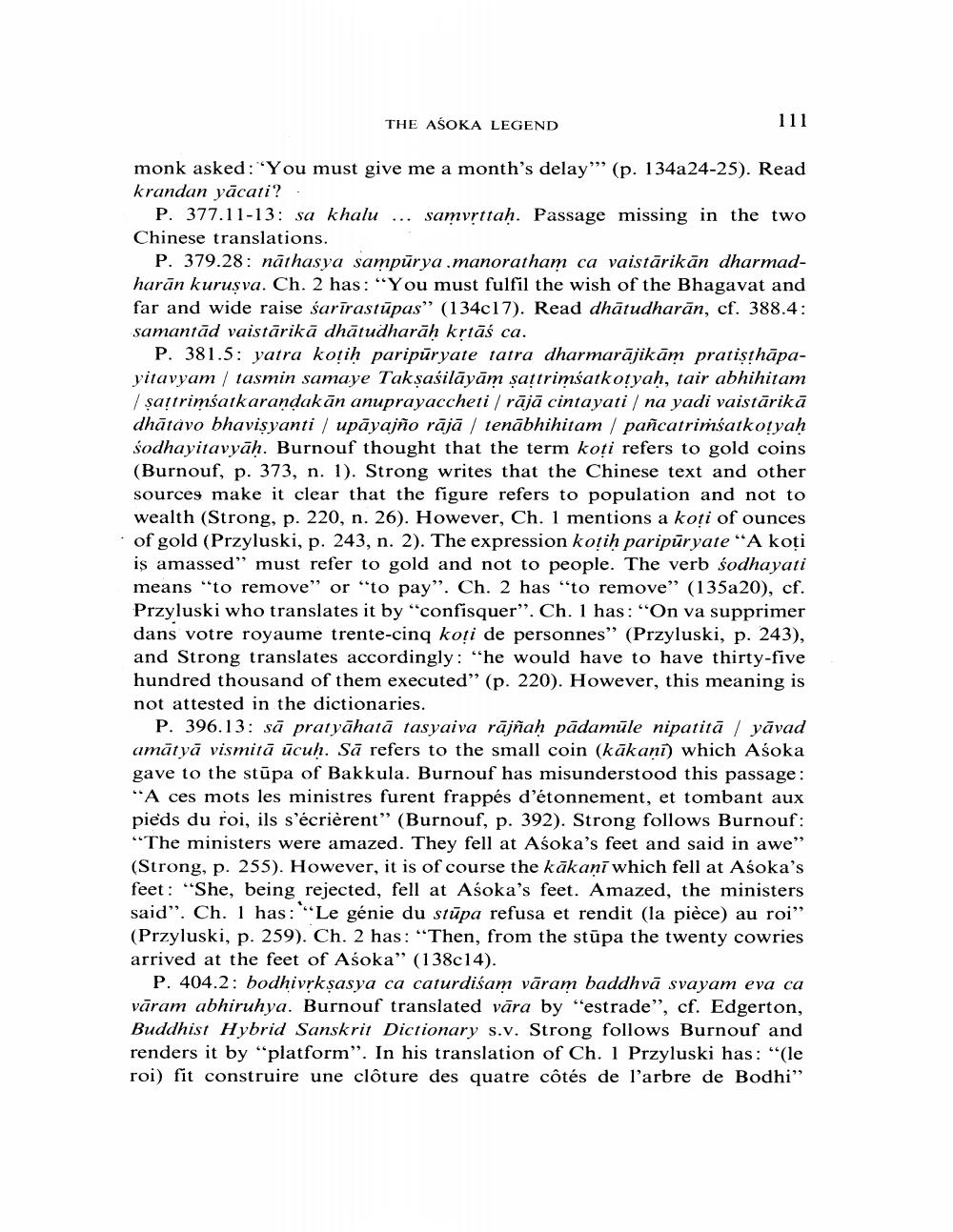Book Title: Notes On Text Of Asoka Legend Author(s): J W De Jong Publisher: J W De Jong View full book textPage 9
________________ THE ASOKA LEGEND 111 monk asked: You must give me a month's delay"” (p. 134a 24-25). Read krandan yācati?. P. 377.11-13: sa khalu ... samvrttah. Passage missing in the two Chinese translations. P. 379.28: näthasya sampūrya.manoratham ca vaistārikān dharmadharān kuruşva. Ch. 2 has: “You must fulfil the wish of the Bhagavat and far and wide raise sarīrastūpas" (134c17). Read dhātudharān, cf. 388.4: samantād vaistārikā dhātudharāh krtās ca. P. 381.5: yatra koțih paripuryate tatra dharmarājikām pratisthāpayitavyam / tasmin samaye Takşašilāyām şaţtrimśatkotyah, tair abhihitam / satrimśatkarandakan anuprayaccheti / rājā cintayati / na yadi vaistārikā dhātavo bhavisyanti / upāyajño rājā / tenābhihitam / pañcatrimśatkotyah sodhayitavyāḥ. Burnouf thought that the term koți refers to gold coins (Burnouf, p. 373, n. 1). Strong writes that the Chinese text and other sources make it clear that the figure refers to population and not to wealth (Strong, p. 220, n. 26). However, Ch. 1 mentions a koti of ounces of gold (Przyluski, p. 243, n. 2). The expression kotih paripūryate "A koți is amassed" must refer to gold and not to people. The verb śodhayati means "to remove" or "to pay". Ch. 2 has "to remove" (135a 20), cf. Przyluski who translates it by “confisquer". Ch. 1 has: "On va supprimer dans votre royaume trente-cinq koți de personnes" (Przyluski, p. 243), and Strong translates accordingly: "he would have to have thirty-five hundred thousand of them executed" (p. 220). However, this meaning is not attested in the dictionaries. P. 396.13: sā pratyāhatā tasyaiva rājñaḥ pādamūle nipatitā / yāvad amātyā vismitā ūcuḥ. Să refers to the small coin (kākani) which Asoka gave to the stūpa of Bakkula. Burnouf has misunderstood this passage: “A ces mots les ministres furent frappés d'étonnement, et tombant aux pieds du roi, ils s'écrièrent" (Burnouf, p. 392). Strong follows Burnouf: "The ministers were amazed. They fell at Asoka's feet and said in awe" (Strong, p. 255). However, it is of course the kākani which fell at Asoka's feet: "She, being rejected, fell at Asoka's feet. Amazed, the ministers said". Ch. 1 has: "Le génie du stūpa refusa et rendit (la pièce) au roi" (Przyluski, p. 259). Ch. 2 has: "Then, from the stūpa the twenty cowries arrived at the feet of Asoka" (138c14). P. 404.2: bodhivrk şasya ca caturdiśam vāram baddhvā svayam eva ca vāram abhiruhya. Burnouf translated vāra by "estrade", cf. Edgerton, Buddhist Hybrid Sanskrit Dictionary s.v. Strong follows Burnouf and renders it by platform". In his translation of Ch. 1 Przyluski has: "(le roi) fit construire une clôture des quatre côtés de l'arbre de Bodhi"Page Navigation
1 ... 7 8 9 10 11
